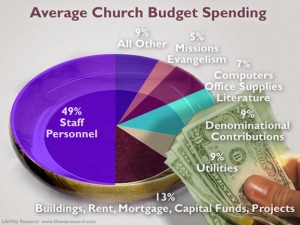Earlier today I published a post about what the Bible says about tithing and how it is decidedly differant than our regular understandings. It was supposed to be a quick post, but ended up covering quite a bit of ground. Rather than launch into the implications of my findings in that post, I decided to break it off into a seperate discussion.
Here is the cliff notes version of the previous post:
- The only references to tithing in the New Testament either refer to Old Testament events, or are connected with religious leaders who miss the point. Instead of tithing, a holistic understanding of giving is provided which emphasizes all things are God’s and are for God’s people.
- The Old Testament tithe consisted of things produced from the land and was given to the Levites, aliens, orphans and widows – the four groups of people most marginalized because they lack land.
- While some passages only mention that the tithe goes to the Levites, the more detailed passages say the tithe is to be taken to the temple (implied) and everyone is to consume it with their families in celebration. There is even a provision that allows for people to sell their tithe and then use the money to buy whatever “party supplies” they wanted including wine and strong drink. (See Deuteronomy 12:12-29 for all the details).
How does this jive with what we regularly practice regarding tithing or have been taught? Here are some things we may need to rethink:
The Christian requirement for giving is 10%
This obviously doesn’t come from the New Testament, instead, it is a co-opting of an Old Testament idea. BUT… if we are thorough in adopting the OT understanding of giving, we must also include the various offerings which accopany the tithe. In the end, setting a 10% standard is more about convienance than biblical truth. This is especially true if are neglecting to fully implement the concept as presented in the OT.
The tithe is to go to the church
This seems logical if we are trying to transition a concept centered around the temple into a world where the temple does not exist (and even if it did, would hold little significance for Christians). If we understand that everything belongs to God, and we should give 10% of our assets (money) back to him, then it makes sense to give that to the church. But, there are a couple breakdowns in that conclusion.
First, we must remember the tithe was not given to God (although a tithe of the tithe was — and that probably went to the priest), but rather it was given to the Levites (at least according to Leviticus). Since 50-75% of church budgets go to salaries that shouldn’t be a problem — except it is. Even though Levites were the ministers of the day, it is not a clear correlation between them then and church staff members today. You see, Levites were not given a salary, they were given food: grain and meat. Furthermore, it was not wages they were being paid, but rather it was part of their blessing from God. You see, when the promise land was divvied up, they did not get a share of their own, but were promised 10% of the yield of everyone else’s. In essence, they were marginalized because they could not own land, but they were liberated because they lived on the gifts of others. The tithe was how they survived day to day so they could minister, not how they earned a living so they could buy whatever they wanted. In fact, the tithe was only given to the Levites as part of a larger celebration. Whenever people had their yearly celebration of God’s blessing, they were to invite the Levites along and everyone would partake in the festivities together. In other words, these servants received their share through an intimate connection with communal life. The idea was not: “here is your share, go have your own fun.” Instead it was: “we are celebrating together, come with us and have part of what God has blessed us with.” This is not the salary structure we have in place at churches today. We pay people to fulfill ministerial services for the church.
Even if we look at the more straightforward passages that only say 10% goes to the Levites without mention of a larger celebration, we find this model does not fit into modern church life. Take Numbers 18 for instance. It says the tithe goes to the Levites since they have no inheritance. This idea is grounded in an understanding of God’s blessing that is linked to inheritance and land. With the new covenant, the promise is no longer of land, but of adoption as God’s children. The Levites got the tithe because the other tribes got the land. But today, no one has the land. We are no longer a geographically centered religious movement. If we are going to compare our ministers to Levites, we must compare the parishioners to the other tribes who have been given a specific inheritance. That analogy simply does not work. In a post-resurrection church, each of us has the same promise. One group does not need to give to another group because their spiritual promise is different.
Even if we get past salaries, thinking that our tithe goes to the church also neglects the image of communal sharing that is embedded in the scriptures. Families did not give their tithes to central entity to throw a party, rather they came together to a place of communal significance and each family celebrated in their own way. Their unity was through individual contribution, not through corporate design.
Finally, and most importantly, our current model of a tithe going directly to the church neglects the third year. Remember of Deuteronomy 14:28-29, “At the end of every three years, bring all the tithes of that year’s produce and store it in your towns, so that the Levites (who have no allotment or inheritance of their own) and the aliens, the fatherless and the widows who live in your towns may come and eat and be satisfied, and so that the LORD your God may bless you in all the work of your hands.”
Every three years the tithe is supposed to go to meet the needs of the marginalized in society. Not only that, but the needs are to be met within the confines of the community. I doubt many churches can claim that 33% of their income goes to meeting the physical needs of the those on the fringes of society. Even then, when our tithe goes to the church, it often misses the key connection between individuals and the marginalized. Each family is to play a role in meeting the physical needs of those in their community.
God will bless us if we tithe
First, let me say not everyone believes this, but I have heard it enough that it is impossible to ignore. Second, it is not that I don’t think this is true, but at the same time I don’t think there is a causal relationship. It is not an “if-then” situation.
This misunderstanding of the nature of tithing is rooted in a bad analysis of Malachi 3. The prophet argues that Israel is stealing from God by withholding tithes and offerings. After repremanding the nation, he says this in 3:10:
Bring the whole tithe into the storehouse, that there may be food in my house. Test me in this,” says the LORD Almighty, “and see if I will not throw open the floodgates of heaven and pour out so much blessing that you will not have room enough for it.
Sure, the straightforward reading reveals that God promises to bless them if they bring their whole tithe. However, it is the details that are most important. The people are to bring FOOD to God’s house. Why are they bringing food? Based on the scripture we have examined, the only reason they would bring food as a tithe to a storehouse would be so it could be distributed to marginalize — to the Levites, aliens, orphans, and widows. Also, the blessing promised revolves around there being so much food that there will not be a place to store it. But, again the storing of food is intended for those on the outskirts of society. So… God is not just promising people that if they give to the church, he will bless them. Rather, God is saying that if the people of Israel are diligent in setting resources aside for those who need them, he will always ensure there is enough to give.
So what does it all mean?
Let me be clear. I am not arguing that we should not give 10% of our money to the church. Instead, I am saying we need to understand what scripture really says about the tithe and apply that to our giving. Here is what I have concluded:
- The tithe is an Old Testament concept. Instead of focusing on giving a part of our assets, we need to wrestle with understanding what it means that nothing truly belongs to us — it is all God’s and it is for all his people.
- There is nothing special about 10% and in all honesty, focusing on this number might do more harm that good. When we put a percentage on what we give, it is easy to feel satisfied with our giving level.
- We should give so that some people can minister full time. That being said, our giving should be designed so they can live and not in exchange for ministerial services.
- In both the Old Testament understanding of tithe and the New Testament witness to giving, there is a definite bent towards helping the marginalized. Not only should we give so others can live, but we should do it not only corporately but individually as well. This means we have the homeless over to our home for dinner and not just give money to a soup kitchen in the city.
- We are to celebrate the blessings of God communally and include others in the festivities. We are not just talking about Sunday worship; we are talking about complete throw downs with unbelievable extravagance. This is the place where rich and poor all eat the finest meals together because God has called them all to be fulfilled and to be his people.
All of this is tied to the promise bestowed on all of God’s people: We are blessed so we can be a blessing to all.




